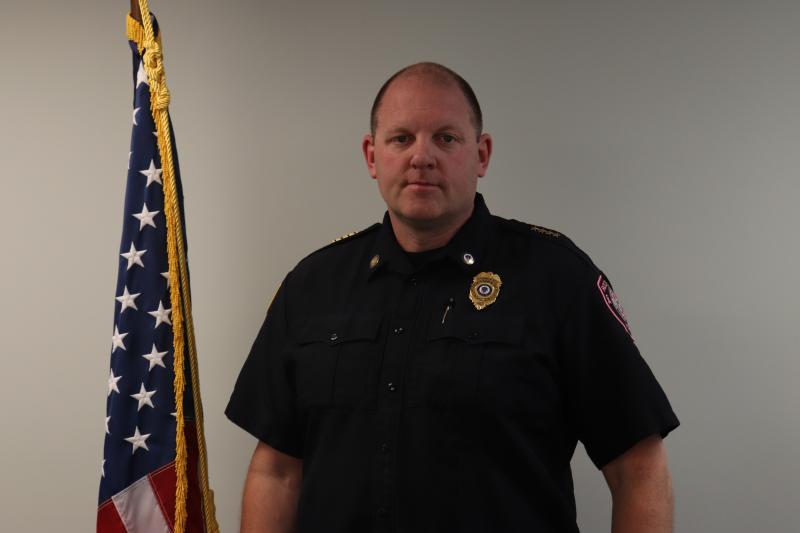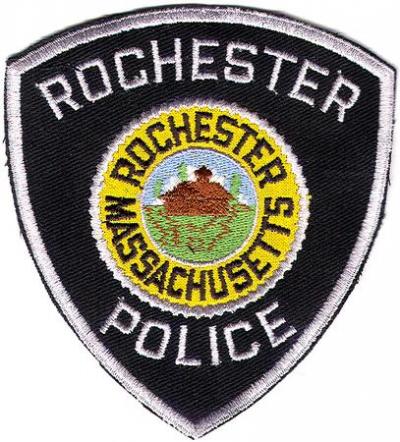Q&A with Rochester Police Chief Robert Small
ROCHESTER — The Rochester Police Department named Robert Small as its new police chief on Sept. 14. Sippican Week sat down with him on Tuesday to learn more about him and his transition to police chief.
Small has been a member of the department for about 20 years and replaced Paul Magee, who served as Rochester Police Chief for 15 years.
Sippican Week: How did you begin your career in law enforcement here in Rochester?
Chief Small: Actually, I grew up in Whitman and went to Whitman-Hanson High School and my father was a police officer in Whitman. I worked there part-time and was looking for a full-time job. At that time, there weren’t many police jobs available, the economy was not real great. I started looking around at non-civil service departments in the area. I came down here and put in an application at a couple of different departments, including Rochester.
At that time, Rochester had a couple of grants that had come out for COPS grants. I actually got hired under one of those grants. That was in February of 1998 and I’ve liked it here, so I’ve stayed since.
SW: What drew you to a career in law enforcement?
CS: I think the fact that my father was a police officer. When I grew up, I saw that and was always pretty close with the guys my father worked with. The job fascinated me, so I just grew up always wanting to do this job.
SW: When did you start thinking about moving up in rank?
CS: As sergeant, I had taken on a lot of responsibility here, which I actually really liked. I still had my regular patrol duties with the added responsibility of being a shift supervisor, but I started taking on a lot more administrative tasks. I took on some of those to help Chief Magee out and then a couple years ago, when he was talking about retiring, he had asked if I was interested in starting to learn the responsibilities to take on his job.
At first, I wasn’t 100 percent sure if that was something I was interested in. I like being a line officer and being on the road, but I also liked some of the responsibilities I had taken on. After a little while, I thought it would probably be a good move for me and my family, it would be something a little different. I thought it would be kind of nice to take that next step.
SW: What new approach do you plan to bring to the position?
CS: A lot of the stuff Chief Magee did I liked. So, I think a lot of it I would like to keep the same but you’re always going to have your own twist on things even if you keep certain programs the same. I think there will be a lot of minor tweaks, and I would like to add a few things.
Certainly, being new I’ve got a new energy and enthusiasm. Whenever you move up in rank you have all these different ideas. I’ve got a few things that I’m working on that I want to move forward with and hopefully improve the department.
SW: What kind of relationship did you have with your predecessor?
CS: It was kind of funny because for years I was the union president. We were very much on opposite sides of the table, as much as you could be. My way of doing things worked with his way of how he ran things.
There were times where he stuck to his guns and things didn’t work out. But there were more times he was amenable to changing things.
It just developed from there and I’m guessing that’s part of the reason why he asked me if I was looking for promotion.
SW: How have you adjusted to the position so far?
CS: I think I’ve done pretty well. It’s certainly an eye opener, but I think the chief really did a good job at preparing me. Once he walks out the door and it’s official, it’s like going for a ride on your bicycle without the training wheels.
It’s fun, it’s a new stage in my career and I like it. I like it here and I like the people I work with so that makes it a lot better.
SW: The Plymouth County Outreach program recently won national recognition, could you tell me more about the program?
CS: Plymouth County Outreach is actually not that old of a program. It just developed in the last few years.
The idea happened because of the huge amount of overdoses from various opioids. Departments needed to get together and do something a little different, other than just legal enforcement of the drug problem. We needed to figure out how to reduce overdoses and the deaths that came as a result.
We try to visit people who have overdosed, after the fact, and we try to do it within 48 hours. We have a couple of civilian workers who go out with an officer from that town in plain clothes and an unmarked car. We don’t want to embarrass anybody.
It’s strictly to build a relationship with the police and people that need help, and not have them feel like we’re there to threaten them with legal action. We’re just there to try and convince them to get some help.
There are 27 cities and towns, plus Bridgewater State, involved. It got some national recognition and recently got an award at the international police conference down in Florida. Along with that there was a grant for about $500,000 over two years. That’s going directly to the program and it will go a long way towards helping us pour more effort into this.
SW: Outside of this job and your work, what do you do that you are passionate about?
CS: Well, that actually a little bit of a tough question. I think in the last year, I’ve poured a lot of time into the job. just prepping to move into the Chief’s spot. When I catch up and feel I can keep my head above water, I’ll back down a little bit and balance my life better.
I do have three daughters and my kids are really into softball. That was a huge thing I poured myself into.
The R.A.D. program here is one thing I want to continue doing. It’s the women’s self defense program we do, that’s something I approached chief Magee with about 14 years ago. I started that program and it’s gotten incredibly good response from everybody that has ever taken it. It’s one of the things I’m really invested in.














